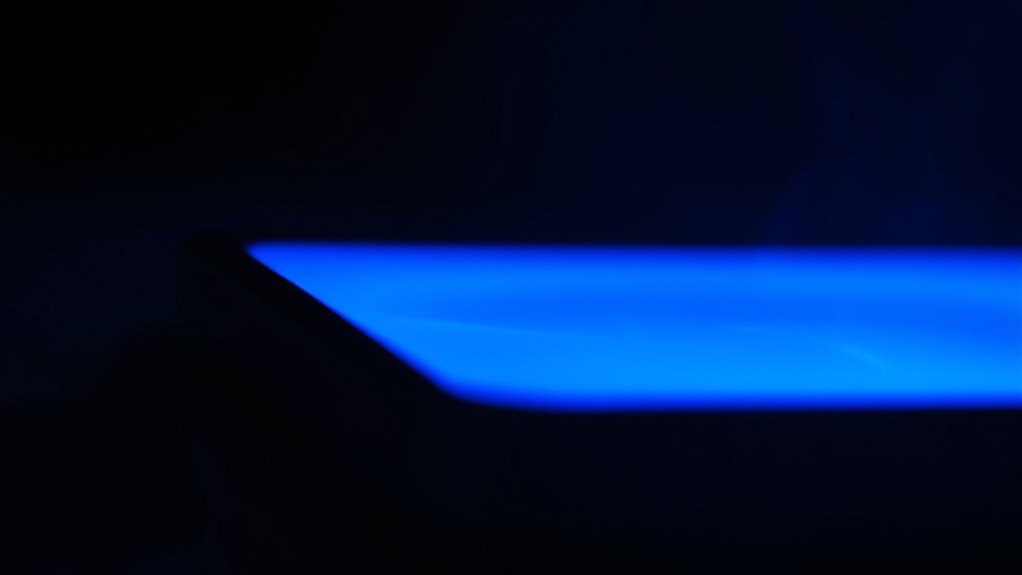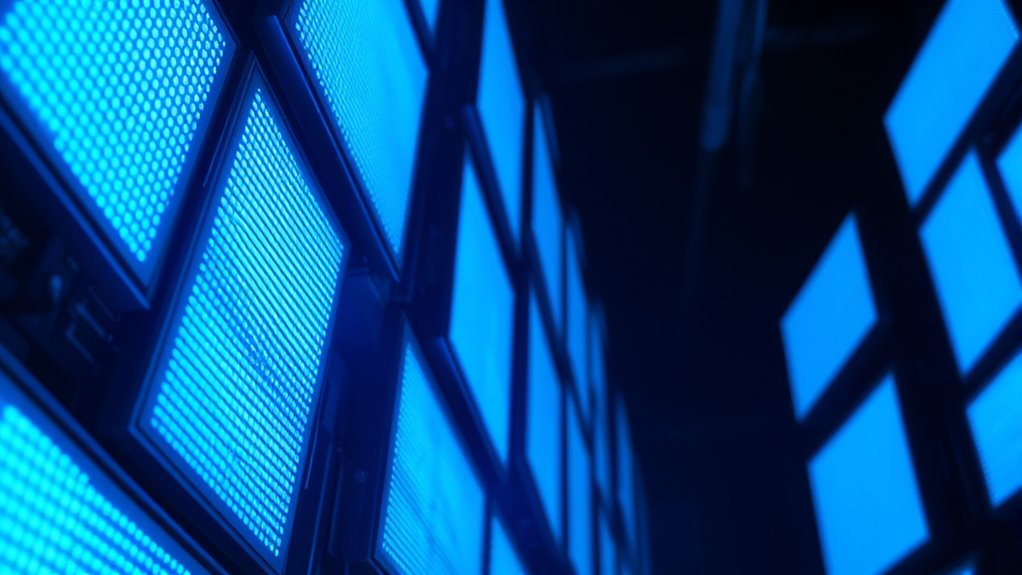Many believe blue light from screens causes permanent eye damage, but science says otherwise. Blue light mainly leads to discomfort and disrupts sleep, not irreversible harm to your eyes. It can cause eye strain and make falling asleep harder if you use devices at night. Managing exposure through screen filters or breaks can help, but there’s no need to fear severe damage. Keep exploring, and you’ll discover clear facts behind these common blue light myths.
Key Takeaways
- Blue light does not cause permanent eye damage or retinal injury; concerns about “dark side” effects are unsupported by science.
- The main issues linked to blue light are digital eye strain and sleep disruption, not irreversible eye harm.
- Blue light from screens can worsen discomfort and interfere with sleep, but these effects are temporary.
- Managing blue light exposure, especially at night, can improve comfort and sleep quality without urgent health risks.
- Myths about blue light’s dangers often exaggerate risks; current research shows it poses minimal threat to eye health.

Have you ever wondered if blue light from screens really harms your eyes? It’s a common concern, especially with all the talk about digital eye strain and sleep disruption. Many people believe that exposure to blue light, emitted by smartphones, tablets, and computers, directly damages their vision. But the reality isn’t quite that simple. While blue light can contribute to discomfort, the evidence doesn’t support the idea that it causes permanent eye damage. Instead, the more pressing issues linked to blue light are digital eye strain and interference with your sleep patterns. Digital eye strain, also called computer vision syndrome, manifests as dry eyes, headaches, blurred vision, and eye fatigue after long hours in front of screens. Blue light exposure can exacerbate these symptoms because it scatters more easily than other wavelengths, making your eyes work harder to focus and causing discomfort. However, this discomfort isn’t necessarily due to damage but rather the strain of prolonged focus and reduced blinking, which is common during screen use. As for sleep disruption, blue light plays a more significant role. Your brain perceives blue light as a signal that it’s daytime, which suppresses melatonin—the hormone responsible for regulating sleep. When you use screens late at night, the blue light can delay your sleep cycle, making it harder to fall asleep and reducing sleep quality. This disruption can leave you feeling groggy and less alert the next day, but it’s important to recognize that it’s a temporary effect rather than a permanent harm. Many studies show that limiting blue light exposure before bed, either by reducing screen time or using blue light filters, can help improve sleep. Despite all the myths, current science suggests that blue light isn’t the villain it’s often made out to be in terms of eye health. The real concern is how prolonged screen time affects comfort and sleep, not actual damage to your retina. You don’t need to panic about blue light causing irreversible damage, but it’s wise to manage your exposure, especially in the evening. Taking regular breaks, practicing the 20-20-20 rule (looking 20 feet away for 20 seconds every 20 minutes), and reducing screen brightness can help alleviate digital eye strain. For better sleep, consider turning off screens an hour before bed or using blue light filters. In addition, AI-powered tools are now available that can help monitor and limit your blue light exposure effectively. In the end, understanding the science helps you make informed choices rather than falling for exaggerated fears that aren’t backed by evidence.
Frequently Asked Questions
Can Blue Light Exposure Improve Alertness During the Day?
Blue light exposure during the day can boost your alertness by influencing your circadian rhythm. When you get natural or artificial blue light, it signals your brain to stay awake and alert, helping you perform better and stay focused. This alertness enhancement is especially useful in the morning or during dull afternoons, making blue light a natural way to improve daytime wakefulness and maintain your energy levels.
Does Blue Light Exposure Cause Permanent Eye Damage?
You might wonder if blue light exposure causes permanent eye damage. While extended exposure can lead to eye strain and discomfort, current research shows there’s no conclusive evidence that blue light causes retinal damage or permanent harm. However, prolonged screen time can cause eye fatigue, so it’s smart to take breaks and use proper lighting. Protect your eyes by limiting exposure and practicing good eye care habits.
Are All Blue Light Filtering Devices Equally Effective?
Not all blue light filtering devices are equally effective. Filtering technology varies widely, impacting device efficacy. Some screens and glasses block a significant portion of blue light, while others provide minimal protection. To guarantee you’re getting the best results, look for products with proven filtering capabilities and reviews. Remember, choosing the right device depends on understanding the specific filtering technology used and how effectively it reduces blue light exposure.
Can Blue Light Affect Sleep Quality Even if I Wear Glasses?
Wearing glasses that block blue light can help reduce sleep disruption caused by technology use, but they might not completely prevent blue light from affecting your sleep quality. Blue light can still reach your eyes indirectly and impact your circadian rhythm, affecting eye health too. So, even with glasses, it’s good to limit screen time before bed, and consider other strategies to improve your sleep and protect your eyes.
Is Blue Light Harmful to Children’S Developing Eyes?
You might wonder if blue light harms children’s developing eyes. While there’s some concern about blue light contributing to digital eye strain, current research suggests it’s unlikely to cause long-term damage to eye development. However, excessive screen time can lead to eye discomfort and fatigue. To protect your child’s eyes, encourage regular breaks and limit screen exposure, especially before bedtime.
Conclusion
Just as a lighthouse guides sailors safely through foggy nights, understanding blue light reveals what truly illuminates our health. Don’t let myths trap you in a storm of misinformation; instead, navigate with science as your compass. Recognize that not all darkness is dangerous, and not all light is harmful. When you decode blue light’s mysteries, you steer your well-being toward clarity, avoiding the siren’s call of false fears and charting a course grounded in truth.









